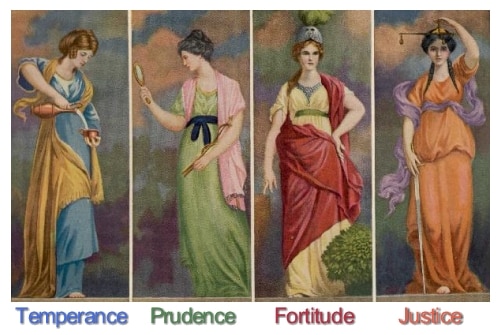Embracing the Four Cardinal Virtues: A Guiding Light for Freemasons
Brethren, today we delve into the rich tapestry of Masonic tradition by exploring the Four Cardinal Virtues: Prudence, Temperance, Fortitude, and Justice. These virtues, foundational to both ancient philosophy and our Masonic teachings, serve as timeless beacons guiding our moral compass.
1. Prudence: The Wisdom of Thoughtful Action
Prudence is the virtue of wisdom, essential for making sound decisions. Plato described it as the wisdom of reason, a trait vital for distinguishing right from wrong. In our Masonic journey, prudence helps us navigate our lives and interactions, ensuring our actions reflect thoughtful judgment. The Stoics also valued prudence, viewing it as the ability to make the right choices based on understanding and reason.
2. Temperance: The Balance of Desires
Temperance embodies self-control and moderation, qualities that Plato associated with managing our appetites and passions. For Freemasons, temperance is about maintaining balance in our lives, ensuring that our desires do not lead us astray from our moral and ethical commitments. The Stoics viewed temperance as crucial for maintaining harmony within the soul.
3. Fortitude: The Courage to Endure
Fortitude, or courage, is the strength to confront challenges and persevere through adversity. Both Plato and the Stoics extolled this virtue as essential for the soul and society. As Masons, fortitude empowers us to uphold our values and commitments, even in the face of difficulty. This virtue allows us to move beyond good intentions and act virtuously.
4. Justice: The Equilibrium of Fairness
Justice is the virtue that harmonizes the other three, ensuring fairness and equity. In both ancient philosophy and Masonic practice, justice is about giving each individual their due. This virtue is integral to our Masonic principles, guiding us to act justly in all our dealings. The Stoics considered justice essential for a harmonious society, promoting fairness and the common good.
“Plato divides society into three groups.
1. The aristocrats are the educated; they should be wise [Prudence].
2. The workers (merchants, commoners) do the work; they should be temperate (have self-control) [Temperance].
3. The soldiers (guardians) protect the city; they should be courageous (brave) [Fortitude].
For Plato, Justice in society is the proper conformity of the three groups to their social roles. Each group has its own place, according to its natural abilities. The aristocrats are to rule wisely, and the other groups are to obey and to do their own tasks. This will promote the happiness of the city and of its members.”
These virtues, deeply embedded in our Masonic education, are not just philosophical ideals but practical guides for our daily lives. By embodying Prudence, Temperance, Fortitude, and Justice, we strengthen our character and contribute to the harmony and betterment of our Lodge and society.
The importance of these virtues is emphasized in our Masonic degrees, particularly the Entered Apprentice Mason degree, which introduces us to these fundamental principles. This degree reminds us of our commitment to live by these virtues and uphold the high standards of our fraternity.
Let us, as Freemasons, continue to reflect on and cultivate these virtues, allowing them to illuminate our path and inspire our actions. For a deeper exploration, visit St. John’s Lodge No. 21 and other educational resources available to us. Sources used were also found at Lodge Waikato No. 475 and A Travelling Freemason.


